Report on the Statutory Duties of a Company Director under Section 171
VerifiedAdded on 2023/01/11
|6
|1116
|61
Report
AI Summary
This report provides a concise overview of the duties and responsibilities of company directors, specifically focusing on Section 171 of the Companies Act 2006. It outlines the director's duty to act within their powers, as defined by the company's constitution, and the duty to act for proper purposes, emphasizing the importance of acting in the best interests of the company and its shareholders. The report uses examples to illustrate potential breaches of these duties. Furthermore, it details the consequences of breaching these duties, including compensation for damages, restoration of company property, and potential legal action. The report highlights the importance of clear policies and procedures to ensure directors fulfill their obligations and avoid misconduct. Finally, the report emphasizes the role of derivative claims in protecting shareholder interests against director misconduct.
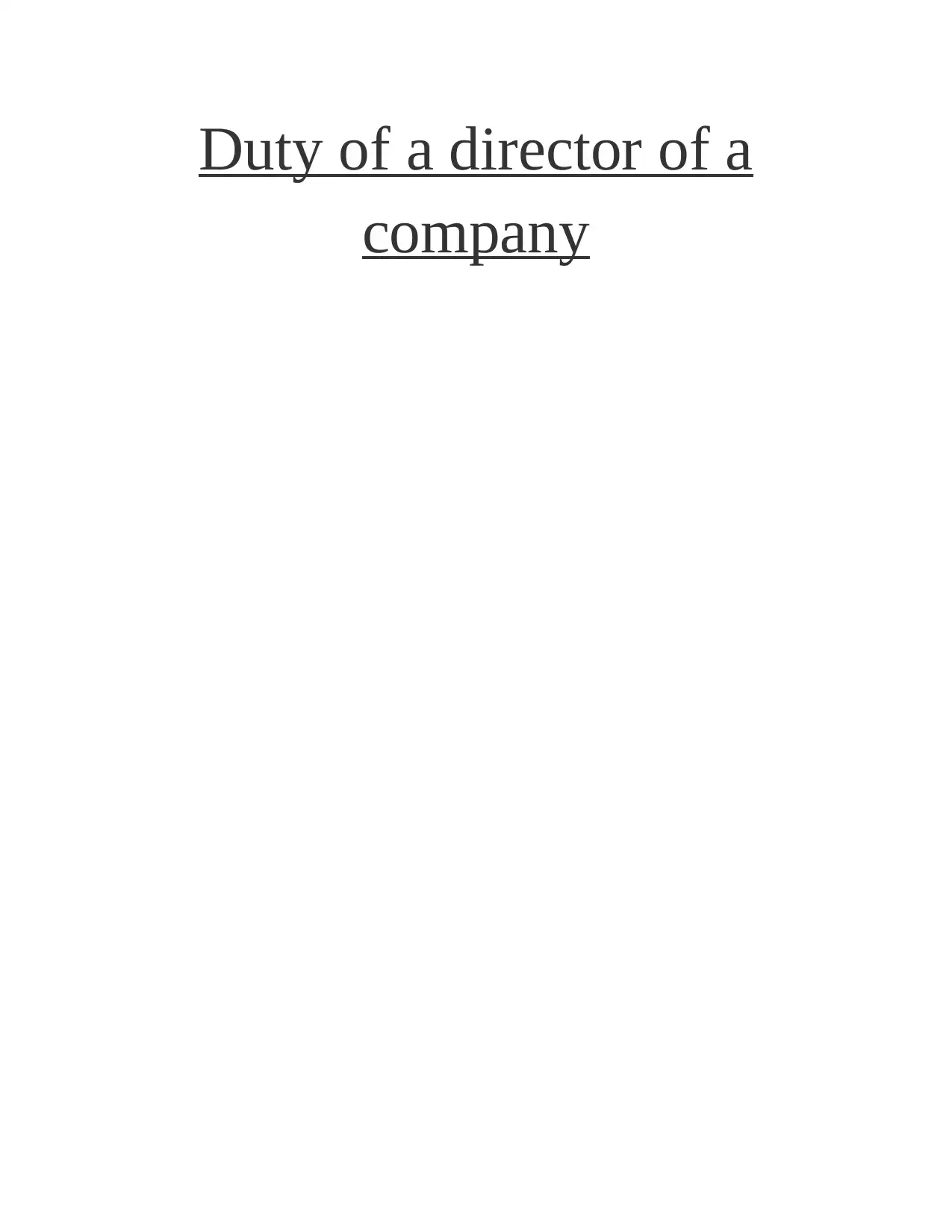
Duty of a director of a
company
company
Paraphrase This Document
Need a fresh take? Get an instant paraphrase of this document with our AI Paraphraser
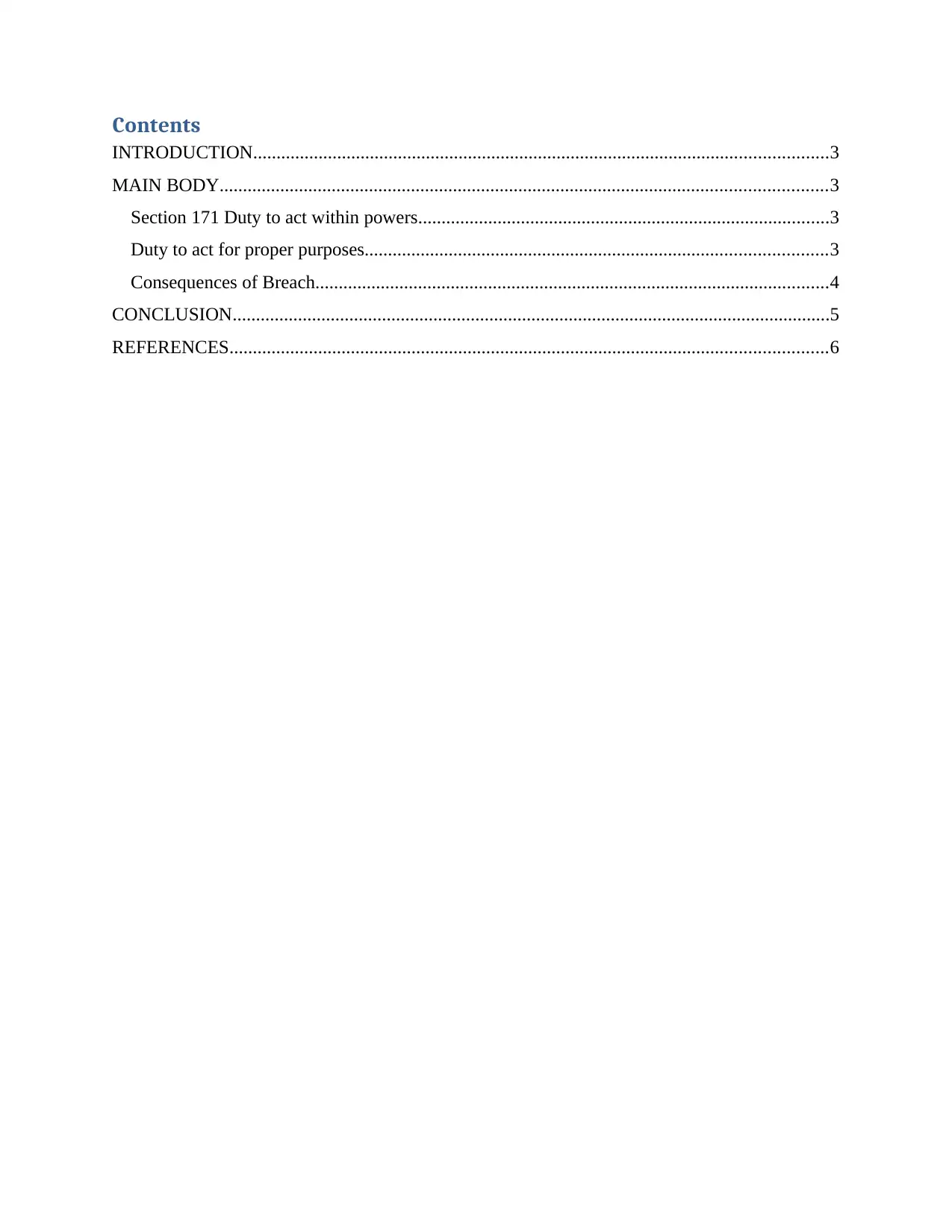
Contents
INTRODUCTION...........................................................................................................................3
MAIN BODY..................................................................................................................................3
Section 171 Duty to act within powers........................................................................................3
Duty to act for proper purposes...................................................................................................3
Consequences of Breach..............................................................................................................4
CONCLUSION................................................................................................................................5
REFERENCES................................................................................................................................6
INTRODUCTION...........................................................................................................................3
MAIN BODY..................................................................................................................................3
Section 171 Duty to act within powers........................................................................................3
Duty to act for proper purposes...................................................................................................3
Consequences of Breach..............................................................................................................4
CONCLUSION................................................................................................................................5
REFERENCES................................................................................................................................6
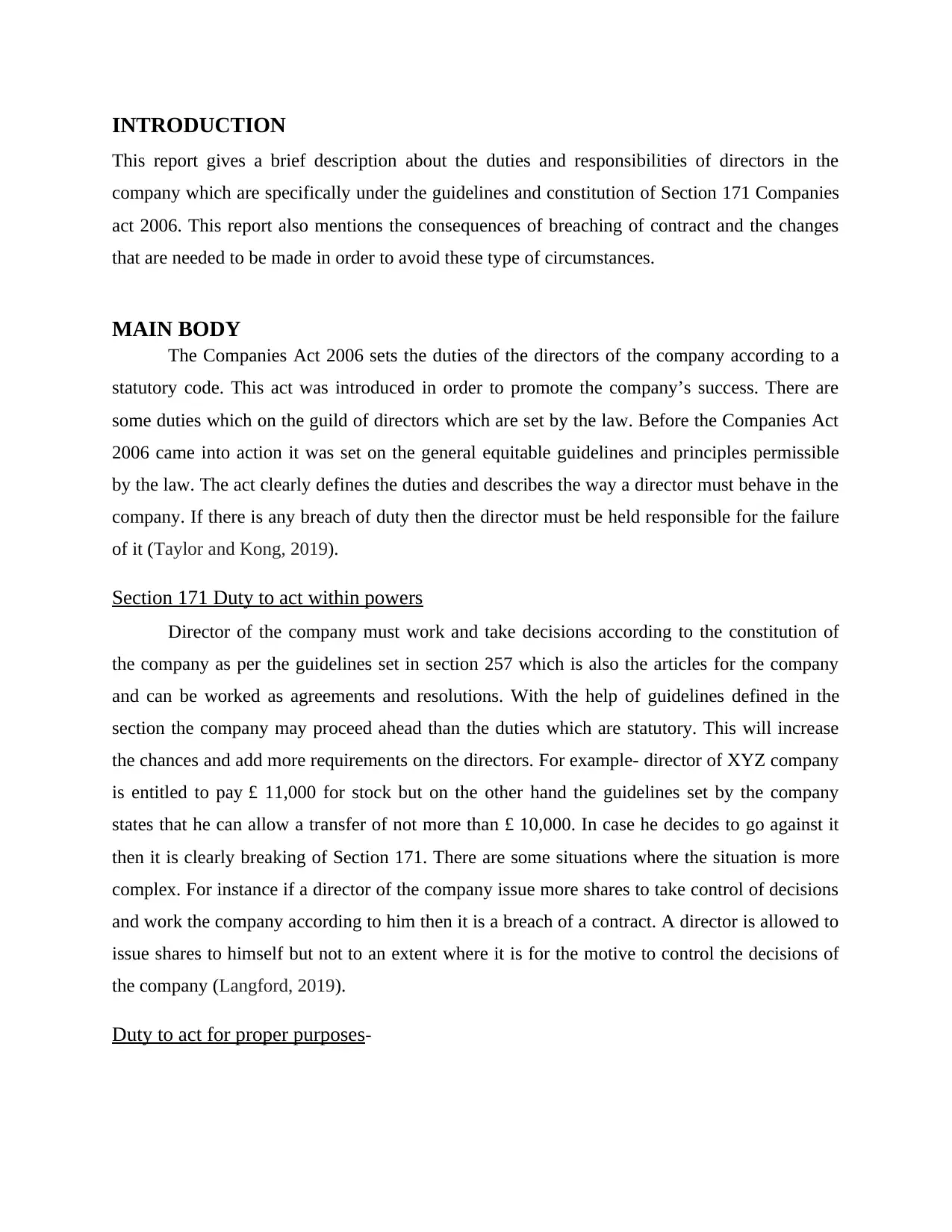
INTRODUCTION
This report gives a brief description about the duties and responsibilities of directors in the
company which are specifically under the guidelines and constitution of Section 171 Companies
act 2006. This report also mentions the consequences of breaching of contract and the changes
that are needed to be made in order to avoid these type of circumstances.
MAIN BODY
The Companies Act 2006 sets the duties of the directors of the company according to a
statutory code. This act was introduced in order to promote the company’s success. There are
some duties which on the guild of directors which are set by the law. Before the Companies Act
2006 came into action it was set on the general equitable guidelines and principles permissible
by the law. The act clearly defines the duties and describes the way a director must behave in the
company. If there is any breach of duty then the director must be held responsible for the failure
of it (Taylor and Kong, 2019).
Section 171 Duty to act within powers
Director of the company must work and take decisions according to the constitution of
the company as per the guidelines set in section 257 which is also the articles for the company
and can be worked as agreements and resolutions. With the help of guidelines defined in the
section the company may proceed ahead than the duties which are statutory. This will increase
the chances and add more requirements on the directors. For example- director of XYZ company
is entitled to pay £ 11,000 for stock but on the other hand the guidelines set by the company
states that he can allow a transfer of not more than £ 10,000. In case he decides to go against it
then it is clearly breaking of Section 171. There are some situations where the situation is more
complex. For instance if a director of the company issue more shares to take control of decisions
and work the company according to him then it is a breach of a contract. A director is allowed to
issue shares to himself but not to an extent where it is for the motive to control the decisions of
the company (Langford, 2019).
Duty to act for proper purposes-
This report gives a brief description about the duties and responsibilities of directors in the
company which are specifically under the guidelines and constitution of Section 171 Companies
act 2006. This report also mentions the consequences of breaching of contract and the changes
that are needed to be made in order to avoid these type of circumstances.
MAIN BODY
The Companies Act 2006 sets the duties of the directors of the company according to a
statutory code. This act was introduced in order to promote the company’s success. There are
some duties which on the guild of directors which are set by the law. Before the Companies Act
2006 came into action it was set on the general equitable guidelines and principles permissible
by the law. The act clearly defines the duties and describes the way a director must behave in the
company. If there is any breach of duty then the director must be held responsible for the failure
of it (Taylor and Kong, 2019).
Section 171 Duty to act within powers
Director of the company must work and take decisions according to the constitution of
the company as per the guidelines set in section 257 which is also the articles for the company
and can be worked as agreements and resolutions. With the help of guidelines defined in the
section the company may proceed ahead than the duties which are statutory. This will increase
the chances and add more requirements on the directors. For example- director of XYZ company
is entitled to pay £ 11,000 for stock but on the other hand the guidelines set by the company
states that he can allow a transfer of not more than £ 10,000. In case he decides to go against it
then it is clearly breaking of Section 171. There are some situations where the situation is more
complex. For instance if a director of the company issue more shares to take control of decisions
and work the company according to him then it is a breach of a contract. A director is allowed to
issue shares to himself but not to an extent where it is for the motive to control the decisions of
the company (Langford, 2019).
Duty to act for proper purposes-
⊘ This is a preview!⊘
Do you want full access?
Subscribe today to unlock all pages.

Trusted by 1+ million students worldwide
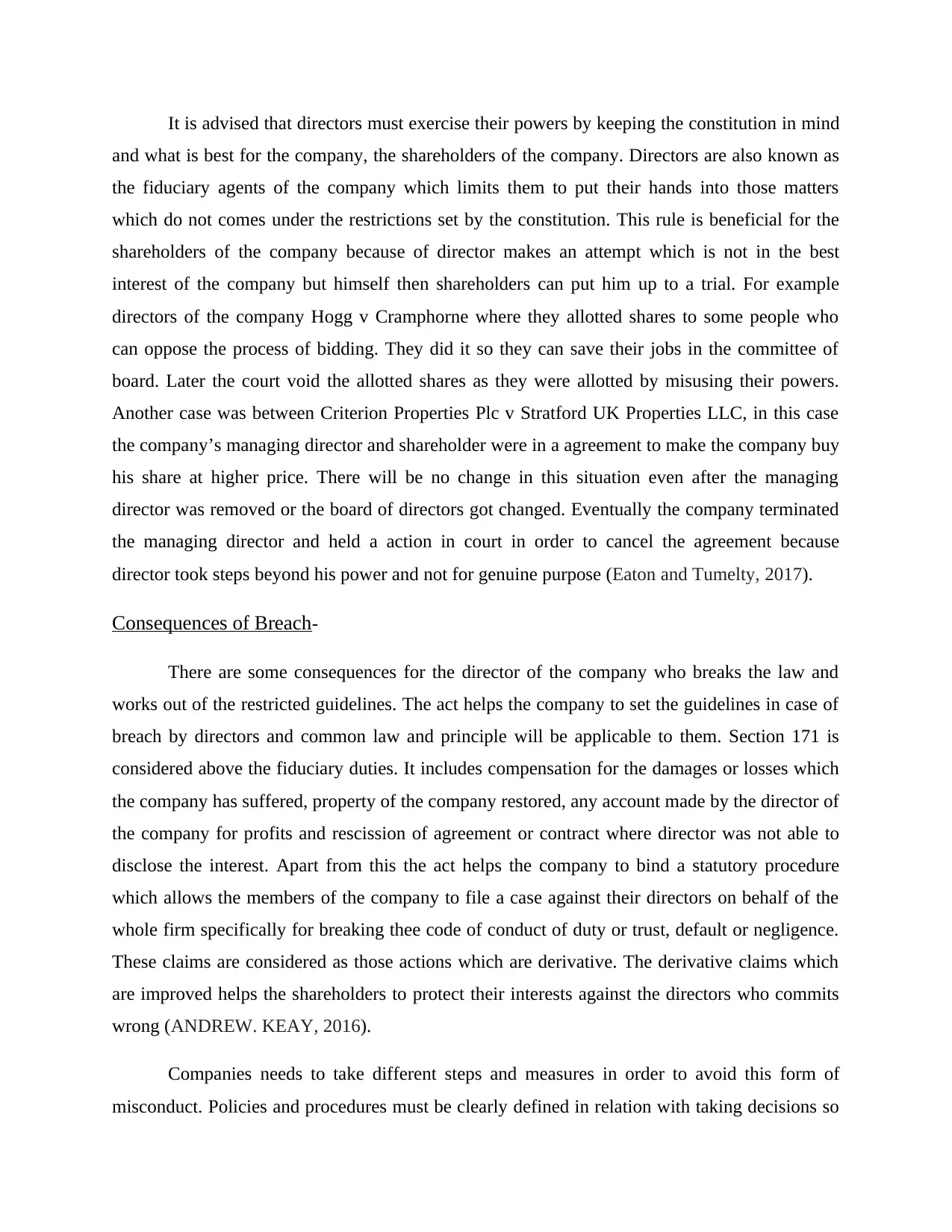
It is advised that directors must exercise their powers by keeping the constitution in mind
and what is best for the company, the shareholders of the company. Directors are also known as
the fiduciary agents of the company which limits them to put their hands into those matters
which do not comes under the restrictions set by the constitution. This rule is beneficial for the
shareholders of the company because of director makes an attempt which is not in the best
interest of the company but himself then shareholders can put him up to a trial. For example
directors of the company Hogg v Cramphorne where they allotted shares to some people who
can oppose the process of bidding. They did it so they can save their jobs in the committee of
board. Later the court void the allotted shares as they were allotted by misusing their powers.
Another case was between Criterion Properties Plc v Stratford UK Properties LLC, in this case
the company’s managing director and shareholder were in a agreement to make the company buy
his share at higher price. There will be no change in this situation even after the managing
director was removed or the board of directors got changed. Eventually the company terminated
the managing director and held a action in court in order to cancel the agreement because
director took steps beyond his power and not for genuine purpose (Eaton and Tumelty, 2017).
Consequences of Breach-
There are some consequences for the director of the company who breaks the law and
works out of the restricted guidelines. The act helps the company to set the guidelines in case of
breach by directors and common law and principle will be applicable to them. Section 171 is
considered above the fiduciary duties. It includes compensation for the damages or losses which
the company has suffered, property of the company restored, any account made by the director of
the company for profits and rescission of agreement or contract where director was not able to
disclose the interest. Apart from this the act helps the company to bind a statutory procedure
which allows the members of the company to file a case against their directors on behalf of the
whole firm specifically for breaking thee code of conduct of duty or trust, default or negligence.
These claims are considered as those actions which are derivative. The derivative claims which
are improved helps the shareholders to protect their interests against the directors who commits
wrong (ANDREW. KEAY, 2016).
Companies needs to take different steps and measures in order to avoid this form of
misconduct. Policies and procedures must be clearly defined in relation with taking decisions so
and what is best for the company, the shareholders of the company. Directors are also known as
the fiduciary agents of the company which limits them to put their hands into those matters
which do not comes under the restrictions set by the constitution. This rule is beneficial for the
shareholders of the company because of director makes an attempt which is not in the best
interest of the company but himself then shareholders can put him up to a trial. For example
directors of the company Hogg v Cramphorne where they allotted shares to some people who
can oppose the process of bidding. They did it so they can save their jobs in the committee of
board. Later the court void the allotted shares as they were allotted by misusing their powers.
Another case was between Criterion Properties Plc v Stratford UK Properties LLC, in this case
the company’s managing director and shareholder were in a agreement to make the company buy
his share at higher price. There will be no change in this situation even after the managing
director was removed or the board of directors got changed. Eventually the company terminated
the managing director and held a action in court in order to cancel the agreement because
director took steps beyond his power and not for genuine purpose (Eaton and Tumelty, 2017).
Consequences of Breach-
There are some consequences for the director of the company who breaks the law and
works out of the restricted guidelines. The act helps the company to set the guidelines in case of
breach by directors and common law and principle will be applicable to them. Section 171 is
considered above the fiduciary duties. It includes compensation for the damages or losses which
the company has suffered, property of the company restored, any account made by the director of
the company for profits and rescission of agreement or contract where director was not able to
disclose the interest. Apart from this the act helps the company to bind a statutory procedure
which allows the members of the company to file a case against their directors on behalf of the
whole firm specifically for breaking thee code of conduct of duty or trust, default or negligence.
These claims are considered as those actions which are derivative. The derivative claims which
are improved helps the shareholders to protect their interests against the directors who commits
wrong (ANDREW. KEAY, 2016).
Companies needs to take different steps and measures in order to avoid this form of
misconduct. Policies and procedures must be clearly defined in relation with taking decisions so
Paraphrase This Document
Need a fresh take? Get an instant paraphrase of this document with our AI Paraphraser
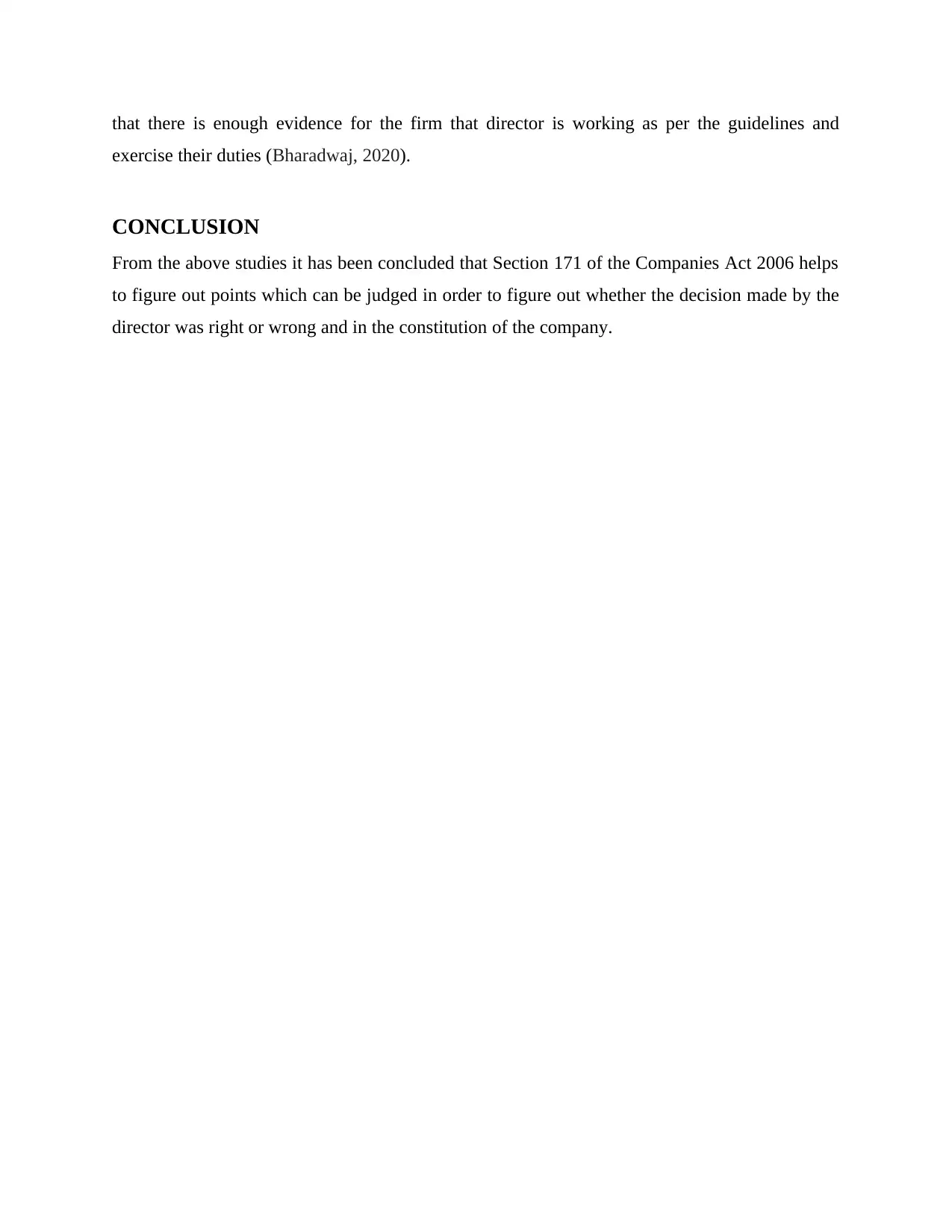
that there is enough evidence for the firm that director is working as per the guidelines and
exercise their duties (Bharadwaj, 2020).
CONCLUSION
From the above studies it has been concluded that Section 171 of the Companies Act 2006 helps
to figure out points which can be judged in order to figure out whether the decision made by the
director was right or wrong and in the constitution of the company.
exercise their duties (Bharadwaj, 2020).
CONCLUSION
From the above studies it has been concluded that Section 171 of the Companies Act 2006 helps
to figure out points which can be judged in order to figure out whether the decision made by the
director was right or wrong and in the constitution of the company.
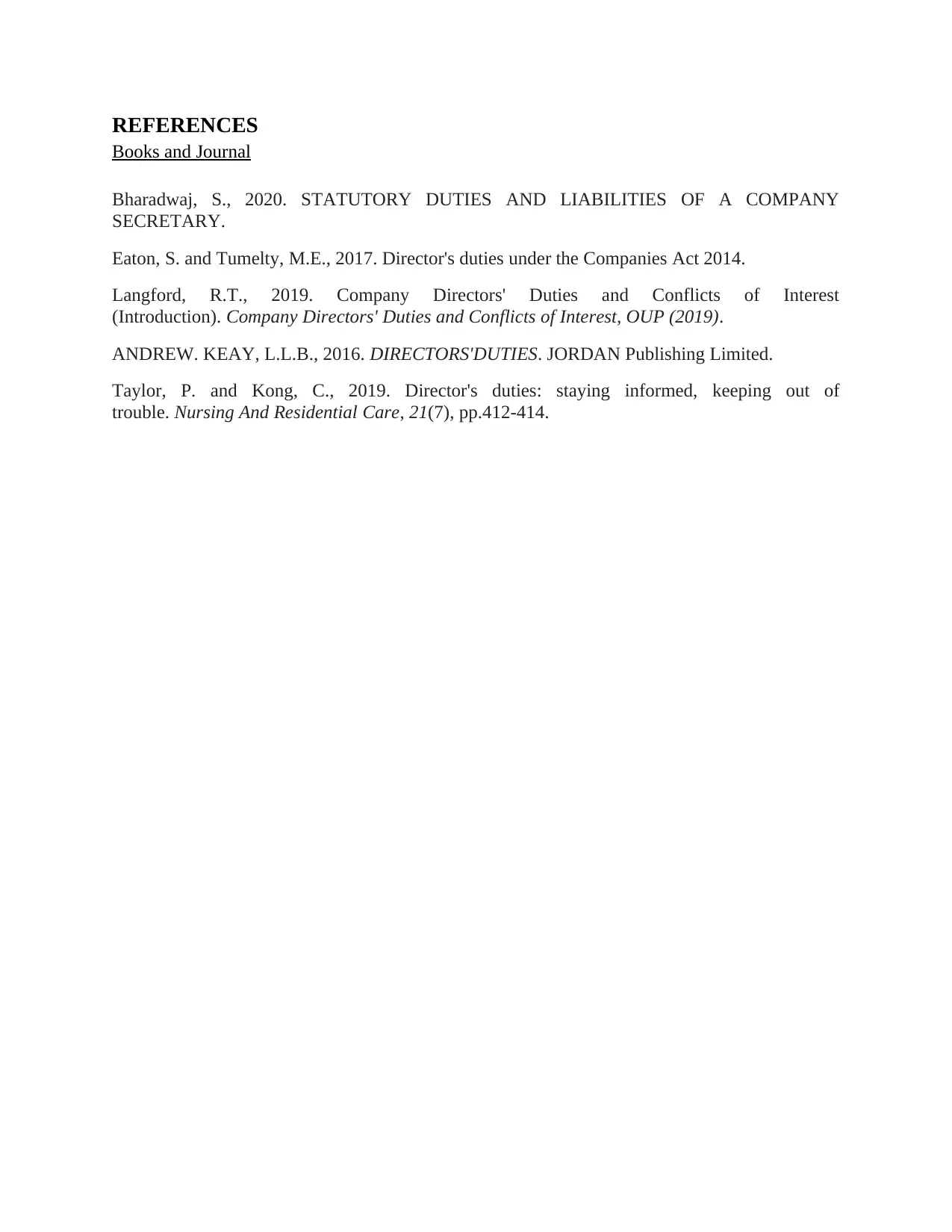
REFERENCES
Books and Journal
Bharadwaj, S., 2020. STATUTORY DUTIES AND LIABILITIES OF A COMPANY
SECRETARY.
Eaton, S. and Tumelty, M.E., 2017. Director's duties under the Companies Act 2014.
Langford, R.T., 2019. Company Directors' Duties and Conflicts of Interest
(Introduction). Company Directors' Duties and Conflicts of Interest, OUP (2019).
ANDREW. KEAY, L.L.B., 2016. DIRECTORS'DUTIES. JORDAN Publishing Limited.
Taylor, P. and Kong, C., 2019. Director's duties: staying informed, keeping out of
trouble. Nursing And Residential Care, 21(7), pp.412-414.
Books and Journal
Bharadwaj, S., 2020. STATUTORY DUTIES AND LIABILITIES OF A COMPANY
SECRETARY.
Eaton, S. and Tumelty, M.E., 2017. Director's duties under the Companies Act 2014.
Langford, R.T., 2019. Company Directors' Duties and Conflicts of Interest
(Introduction). Company Directors' Duties and Conflicts of Interest, OUP (2019).
ANDREW. KEAY, L.L.B., 2016. DIRECTORS'DUTIES. JORDAN Publishing Limited.
Taylor, P. and Kong, C., 2019. Director's duties: staying informed, keeping out of
trouble. Nursing And Residential Care, 21(7), pp.412-414.
⊘ This is a preview!⊘
Do you want full access?
Subscribe today to unlock all pages.

Trusted by 1+ million students worldwide
1 out of 6
Related Documents
Your All-in-One AI-Powered Toolkit for Academic Success.
+13062052269
info@desklib.com
Available 24*7 on WhatsApp / Email
![[object Object]](/_next/static/media/star-bottom.7253800d.svg)
Unlock your academic potential
Copyright © 2020–2025 A2Z Services. All Rights Reserved. Developed and managed by ZUCOL.





